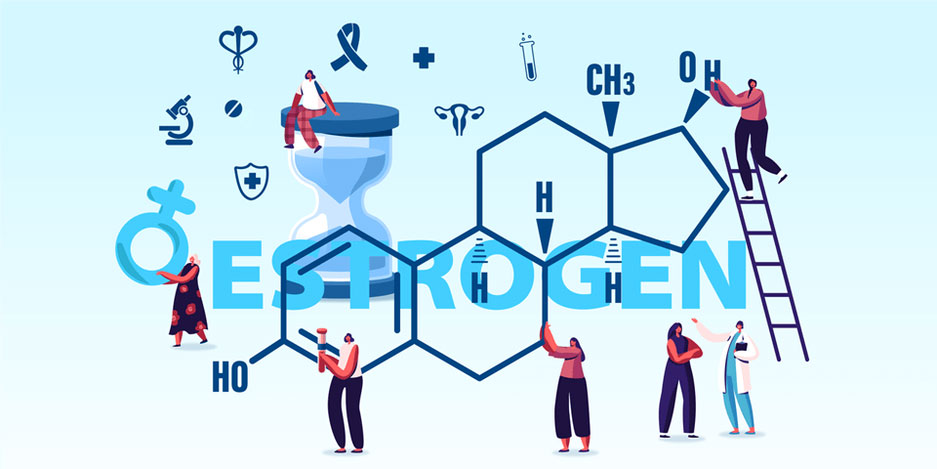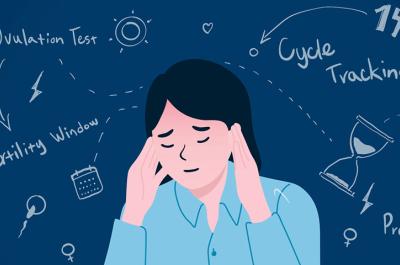Can hormones affect pregnancy test results?

During any given time, your body is full of hormones regulating different functions. If you’re tracking your menstrual cycle, you may know when you ovulate or when your period is due. But what are the actual hormones at play? What other hormones are important in your body? And could they somehow affect a pregnancy test result? Let’s go over a few common hormones, how they work and if they might affect your home pregnancy test (HPT) results.
Can birth control hormones affect pregnancy test results?
Amidst the many options of contraception for family planning, hormonal methods are a popular choice and may include birth control pills, birth control patches and vaginal birth control rings. These methods contain two hormones: estrogen and progestin (though the mini pill is progestin only). Through releasing the two hormones, they prevent pregnancies in multiple ways. They stop ovulation (the release of an egg from one of the ovaries) from occurring, thicken the mucus in the cervix (making it hard for sperm to enter the uterus) and thin the lining of the uterus.1
Home pregnancy tests, including all Clearblue® tests, work by detecting human Chorionic Gonadotropin (hCG), a hormone produced during pregnancy.2 This hormone is not a component of common birth control methods, including the pill.2 So if you’re on the pill, don’t worry about it affecting your HPT result.
Can thyroid hormones affect pregnancy test results?
Your thyroid produces thyroid hormones which send signals to your body that control metabolism. These hormones impact how your body transforms food into energy and influence your body’s blood pressure, heart rate, weight management, body temperature and digestion. Thyroid diseases are more common in women than in men. One in eight women will develop thyroid problems during her lifetime.3 Thyroid conditions can result in problems with your period, as well as complications in getting pregnant and carrying a healthy pregnancy. Your thyroid hormones are crucial in not just your daily life, but in your reproductive health.
Once you are pregnant, thyroid hormones should not impact the presence of hCG in your body, though they can respond to hCG. During pregnancy, hCG stimulates the thyroid gland to create more thyroid hormones, which are important for the baby’s development. If you have a thyroid disease, your body may not respond as well to increased hCG.4 So no, thyroid hormones cannot affect your pregnancy test result — but since they can affect your cycle, they could affect when you test. If you have a known personal or family history of thyroid issues, be sure to consult with your doctor as you try to conceive, as thyroid issues can affect cycles and can also affect when you should test.
Can insulin affect a pregnancy test?
Insulin is a hormone that is made in the pancreas and helps glucose from food get into your body’s cells for energy. If your body does not make enough insulin, or it doesn’t use it correctly, the extra glucose building up in your blood can lead to prediabetes or diabetes. Compared to men with diabetes, women have a higher risk for heart disease, blindness and depression.5
For women with diabetes (Type 1 or Type 2) who want to get pregnant, doctors may recommend additional precautions to keep everyone healthy. Even if you’re not diabetic, 2% to 10% of pregnancies in the United States are affected by gestational diabetes, a type of diabetes that occurs when your body can’t make enough insulin during pregnancy.6 If you have diabetes and are using insulin shots, the added insulin won’t have any impact on your hCG levels or your pregnancy test results. Gestational diabetes usually develops around the 24th week of pregnancy, so that wouldn’t be a factor in early pregnancy detection either.6
Can period hormones affect a pregnancy test?
Throughout your menstrual cycle, your body goes through four phases: menstruation (when you get your period), the follicular phase, ovulation and then the luteal phase. These phases involve rising and falling levels of estrogen, and depending on your PMS symptoms, you might be acutely aware of the changing hormone levels in your body.
Getting your period is a pretty sure sign you’re not pregnant, but if you still want to test during or after your period, know that the hormones changing in your body due to your menstrual cycle will not affect hCG levels, and will therefore not affect results. Blood from your period will also not affect a test’s ability to detect hCG. If your test does come back as positive, you should consult with a doctor as to why you’re bleeding.
So, can hormones affect pregnancy test results?
The short answer is no, the hormones produced in your day to day life and over the course of your menstrual cycle will not affect the results of a home pregnancy test. All home pregnancy tests work by specifically detecting hCG levels in your urine. Human Chorionic Gonadotropin (hCG) is a hormone that stimulates the production of increased estrogen and progesterone during pregnancy, and is the only hormone that affects a test.
True false positives are incredibly rare. However, medications containing hCG can cause false positives. While ectopic or recent pregnancy, even if not carried to full term, can cause misleading results. If you get any unexpected results, you should discuss them with your doctor. Otherwise, your other hormones will not change your test results. Regardless, hormones are still an important part of your body and all the beautiful, fascinating ways it works.
Sources:
- “Combined Hormonal Birth Control: Pill, Patch, and Ring”, (March 2018), The American College of Obstetricians and Gynecologists, https://www.acog.org/womens-health/faqs/combined-hormonal-birth-control-pill-patch-ring
- “Pregnancy tests”, (2021), Office on Women’s Health, https://www.womenshealth.gov/a-z-topics/pregnancy-tests
- “Thyroid disease”, (February 2021), Office on Women’s Health, https://www.womenshealth.gov/a-z-topics/thyroid-disease
- “Thyroid and Pregnancy”, (June 2019), American Thyroid Association, https://www.thyroid.org/wp-content/uploads/publications/ctfp/volume12/issue6/ct_public_v126_11_12.pdf
- “Diabetes”, (May 2022), Office on Women’s Health, https://www.womenshealth.gov/a-z-topics/diabetes
- “Gestational Diabetes”, (August 2021), Centers for Disease Control and Prevention, https://www.cdc.gov/diabetes/basics/gestational.html




